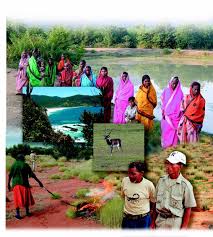
Women of Dangejheri
(Cover of an IUCN Journal)
Dangejheri is a village in the Ranapur Block of Nayagarh District of Odisha State, India. The village has 30 odd households dominated by the Kondh tribe.
As in many parts of Orissa, the forests on the hillocks around Dangejheri had all but vanished by the 1970s. The women of the village had to walk long distances to collect firewood. The forest guards and people of other villages also bothered them. The residents of Dangejheri decided to regenerate and protect the forests near their village. The men organized patrolling parties to prevent illegal cutting of trees. Over a decade, the forests started regenerating. But the village was small and politically weak and the patrolling men faced serious threats from the timber mafia.
Women rise up to protect the forest
Meanwhile, the women of Ranapur villages had formed a federation with the help of the NGO Vasundhara. The women of Dangejheri attended the federation meetings and were emboldened to act against the mafia. On October 26, 1999, a group of 200 men with 70 carts entered the forest and began cutting the trees. The women surrounded the offenders and threatened them with spades and sharp weapons. The men could have used force, but were afraid of being charged with violence against tribal women. They ran away. The women called the federation members and forest officials. They sold the felled timber and deposited the money in a village fund.
After this incident, the women became more confident and started patrolling the forests in groups. They formed a committee to organize the patrols. When they caught an offender, they tied him up to a tree and called the forest committee of his village. He was forced to pay a fine before being released.
The women’s committee also laid down rules for the collection of forest resources in order to maintain sustainability. The committee did not permit any commercial extraction of timber or hunting. The members could only collect dry and fallen wood for fuel. They could also collect minor produce like date palm leaves and bamboos for making articles.
The women began protecting 80 hectares of lush green forest. Soon, wildlife, birds, and insects returned. The forest started holding water and recharging the aquifers. The biggest gain, however, was the surging confidence among the women. The women of Dangejheri became the role models for other villages.
Lessons from the Dangejheri story
Rural women in many countries carry a big burden, because they have to collect water and firewood, besides taking care of the family and earning a living. Normally, they do not make decisions in the community and accept what the men say.
When driven to a corner, however, they are capable of showing great courage and decisiveness. They are often better than men in environmental conservation. That is what happened in Dangejheri. If women are represented in greater numbers in the panchayats (local self-government units), rural India will be a better and different place. There are many cases of community protection of forests elsewhere in India and other countries.
Afterword: This is an inspiring but old story, first documented by the environmental NGO Kalpavriksh. I have been unable to verify the current status of the forest and the women’s initiative.

I am also of the view that women representation in greater numbers, in all walks of life, will make life better not only in rural but urban India as well. I had seen some impact from self help groups in rural areas in the initial stages, when money flowed into their hands. They were more assertive as thy could take many economic decisions. But off-late I see them disrupted by vested interests and they are lured towards micro-credit, where money is the only matter with social issues having gone to the background. Government and institutional support is important to channelise them and make them socially more important. Having seen how the movement which was reckoned as a force at a point in time has dwindled, I am not sure whether vested interests will allow such systems to thrive.